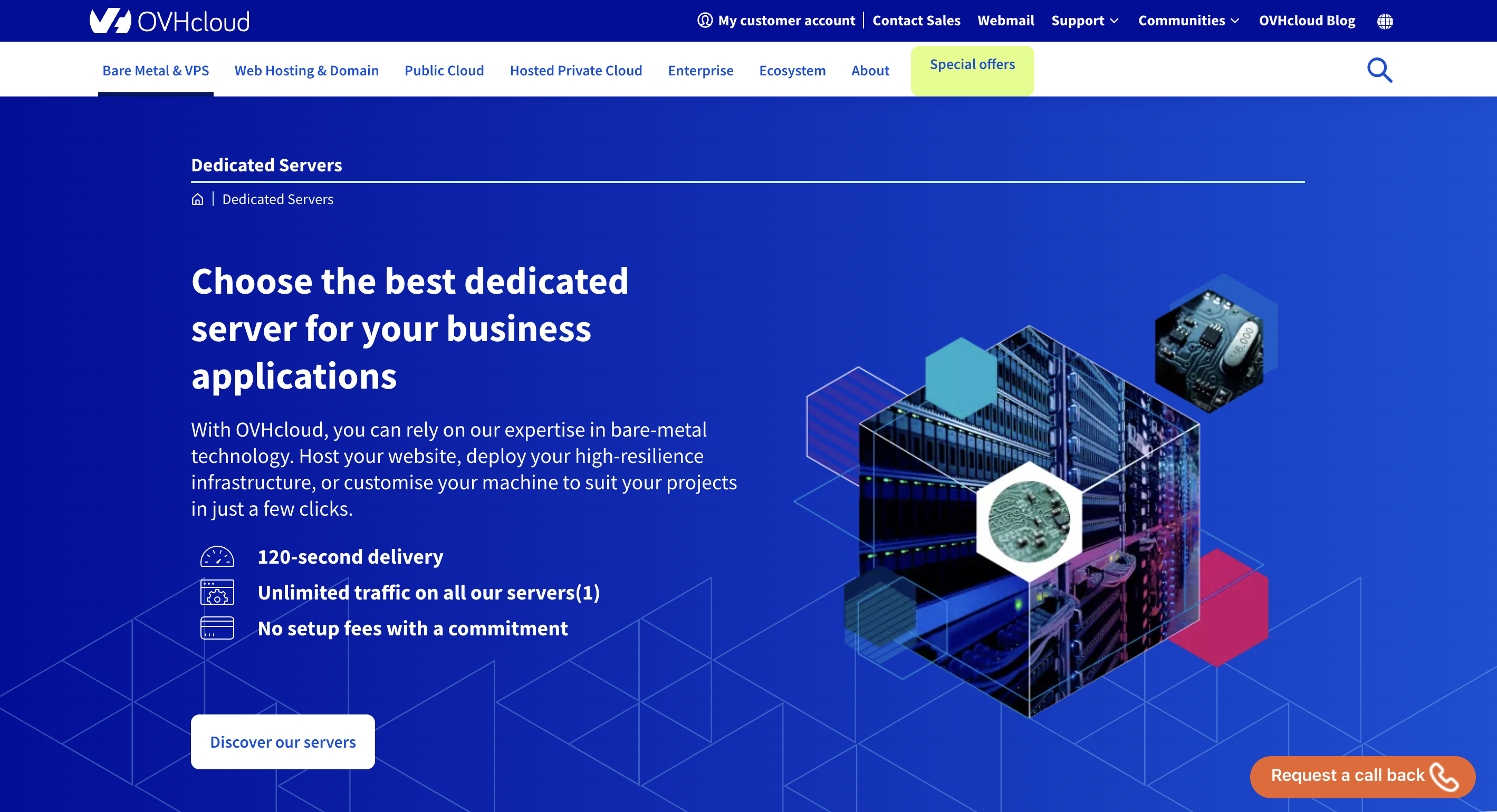TechRadar Verdict
Although OVHcloud’s cloud hosting solutions have managed to put an affordable price tag on their top-notch services, a lot of standard features are lacking and once you pay for them they end up costing the same or more than other providers.
Pros
- +
Easy to set up
- +
Over two decades of industry experience
- +
Pocket-friendly pricing with most plans
- +
Wide variety of different cloud-based servers
- +
Worldwide network of data centers
Cons
- -
No automatic backups
- -
Not novice-friendly at all
- -
“Standard” customer support is almost non-existent
Why you can trust TechRadar
Founded in 1999 by Octave Claba, OVHcloud is a French web hosting company with an international presence thanks to over 400,000 servers spread across more than 43 data centers in four continents. It offers a wide variety of cloud-based solutions to over 1.6 million seemingly satisfied customers. The company is headquartered in Roubaix (France), and its data centers can be found in the USA, Canada, the UK, Ireland, Germany, Poland, France, Singapore, and Australia.
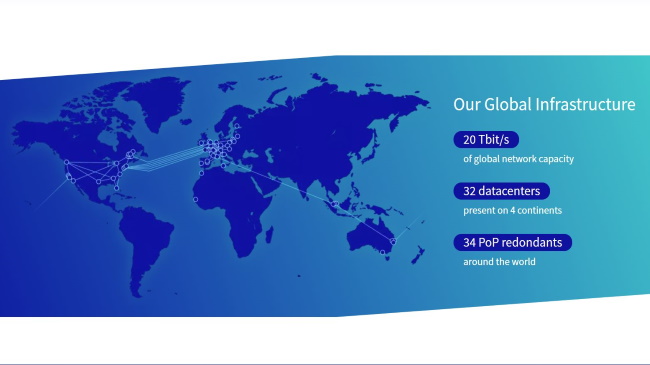
In December of 2010, OVHcloud was revealed to the public as a web hosting provider for WikiLeaks, making them a small part of the story that shook the world. In October of 2021, the company enhanced its public cloud portfolio with a Database as a Service (DBaaS) catalog of services with which its customers would be free of tedious tasks such as database configuration, the set-up, software, and hardware maintenance, and so forth.
- Interested in OVHcloud? Check out the website here
What types of hosting does OVHcloud offer?
As the largest provider in Europe today, OVHcloud offers a wide range of hosting products, from shared and VPS hosting to dedicated and even gaming-optimized servers for hosting. What’s more, it also offers both private and public cloud instances, bringing the benefits of cloud to small, medium, and enterprise customers.
Shared hosting
OVHcloud is one of the cheapest, if not the cheapest, provider when it comes to shared web hosting. Plans start at just $1.04 per month for the Starter Hosting tier which gets you 1 GB of disk space, free domain name for the first year, support for one website, free SSL certificate, anti-DDoS protection, and one-click WordPress installation. What's more, you also get access to OVHcloud’s Web Statistics tool for free, using which you can track page visits and engagement.
For support for more websites and CMS (Joomla!, Drupal, and Prestashop) as well as more storage and number of email accounts, consider upgrading to one of the three higher-end plans which range from $4.39/month to $13.19/month.
Interestingly, though, the shared hosting plans mentioned above do not come with CDN included; perhaps that's why they're among the cheapest plans in the industry. CDN, which reduces the loading time for your pages, will cost an extra $2.79 per month.
Dedicated server hosting
Unlike shared hosting where thousands of websites are hosted and stored on a single server, dedicated hosting allocates all the server disk space and resources to your website—no sharing resources with other websites. This results in better speeds and optimal performance.
With OVHcloud, you can spend anywhere between $50 and $4,000 on a dedicated server. The cheapest of the lot comes with the Intel Xeon E Processor, 32 GB RAM, and 1 TB SSD NVMe storage. This is an excellent package and right up there with the very best dedicated server hosting providers.
A highlight of the service is its filtering system. You can select from a number of options under location, hardware (AMD vs Intel, core/threads, frequency, etc), price, and use cases to filter out the dedicated servers that fit your needs and budget. To put it simply, this is similar to what you get on shopping apps such as Amazon. Even better, the provider has dedicated servers for a wide variety of use cases, including Artificial Intelligence, gaming, grid computing, and so on.
However, I feel that it’s not as secure as it could be. InMotion, for example, comes packed with security features, including free SSL certificates, a custom firewall, DDoS protection, auto-updates, and heavily guarded data centers. To be fair, though, OVHcloud does come with SSL certificates and protection against DDoS attacks and DNS cache poisoning, so there’s a good amount of protection on offer.
VPS hosting
A virtual private server (VPS) divides a single physical server into multiple private server environments. Each of these “private” servers has dedicated resources (meaning better performance than what you’d get with shared hosting), but at the same time, the websites within the one large physical server are still essentially sharing resources, which keeps the cost down.
OVHcloud offers a ton of VPS server options, meaning choosing one is admittedly not as simple as, say, DreamHost or Liquid Web. At the same time, though, some users may like the availability of so many options. Where OVHcloud really sets itself apart is that all of its VPS servers are parts of its cloud environment, so you’ll benefit from auto-scaling, which will allow you to only pay for what you use.
There are a total of eight plans to choose from, ranging from 1-16 CPU cores, 2-16 GB RAM, 20-160 GB SSD NVMe, and up to 2 Gbps unmetered bandwidth. This degree of customization allows you to choose the best plan for your unique requirements—plus, whether it’s a small business with a handful of websites or a large-scale application, there’s a plan for every use case.
Cloud hosting
OVHcloud is hands down one of the best cloud hosting providers on the market right now. First things first, it offers two cloud products—public cloud instances and hosted private cloud. The latter is designed for large enterprises that want high-performance dedicated resources along with the benefits of the cloud. So, OVHcloud’s Public Cloud instances, which combine flexibility, guaranteed resources, and affordable prices, is where the party's at for most businesses and websites.
OVHcloud is particularly great for niche businesses who want to be able to configure a cloud hosting plan to their liking. Where typical cloud hosts offer only a handful of plans, OVHcloud knocks it out of the park with 10+ broad filters, including storage, network, databases, data analytics, etc., all of which then have several subdivisions inside each of them, allowing you to zero in on the perfect plan for your business’s needs.
For instance, if you want to run applications that require high-frequency computing, you can choose a plan from the ‘Compute Optimized’ section. Alternatively, if you dabble in data analysis and data science, a ‘Memory Optimized’ cloud hosting plan will be a perfect choice.
Also, if you want to steer clear of the extreme customization, OVHcloud allows you to do that too—just stick to the ‘General Purpose’ plans that provide balanced CPU/RAM resources. A highlight of OVHcloud is that no matter what plan you pick, you will get a generous $200 credit so that you can test OVHcloud’s services risk-free.
Coming to the costs, the most basic cloud hosting plan is $0.0508 per hour and gets you 8 GB of RAM, 2 vCores, and 50 GB fast NVMe storage. It’s worth noting that you can also opt for monthly billing, although that option is only available from the 7 GB RAM plan onwards.
Is OVHcloud the cheapest cloud hosting? Nope. DreamHost at $0.0075 per hour and IONOS at $0.0056 per hour are much cheaper, meaning they are better suited for users who need the benefits of cloud i.e. auto-scaling and geo-redundancy, but don’t require the amount of power OVHcloud’s most basic plan offers.
However, OVHcloud comes with on-demand resources, meaning that your contact is non-binding—you can delete a resource at any time following which you won't be charged for it. Also, unlike other providers that may charge you for instance network traffic or API calls from Object Storage, OVHcloud offers these for free.
Dedicated solutions for different industries
In addition to the above, where OVHcloud really stands tall is being a highly versatile and customizable hosting provider. Servers with DDoS protection and quick scaling for hosting large-scale video games? Check. Servers that facilitate remote learning and collaboration for the education industry? Check. Minecraft VPS servers—the kind you get with industry leaders such as Hostinger? Check.
Similarly, OVHcloud has a compliant and secure solution for just about every industry, whether that’s healthcare, IT, nonprofit, or the government sector. It also carries the proper attestations and certifications (HIPAA, HITECH, PCI DSS, etc) to be able to be this diverse.
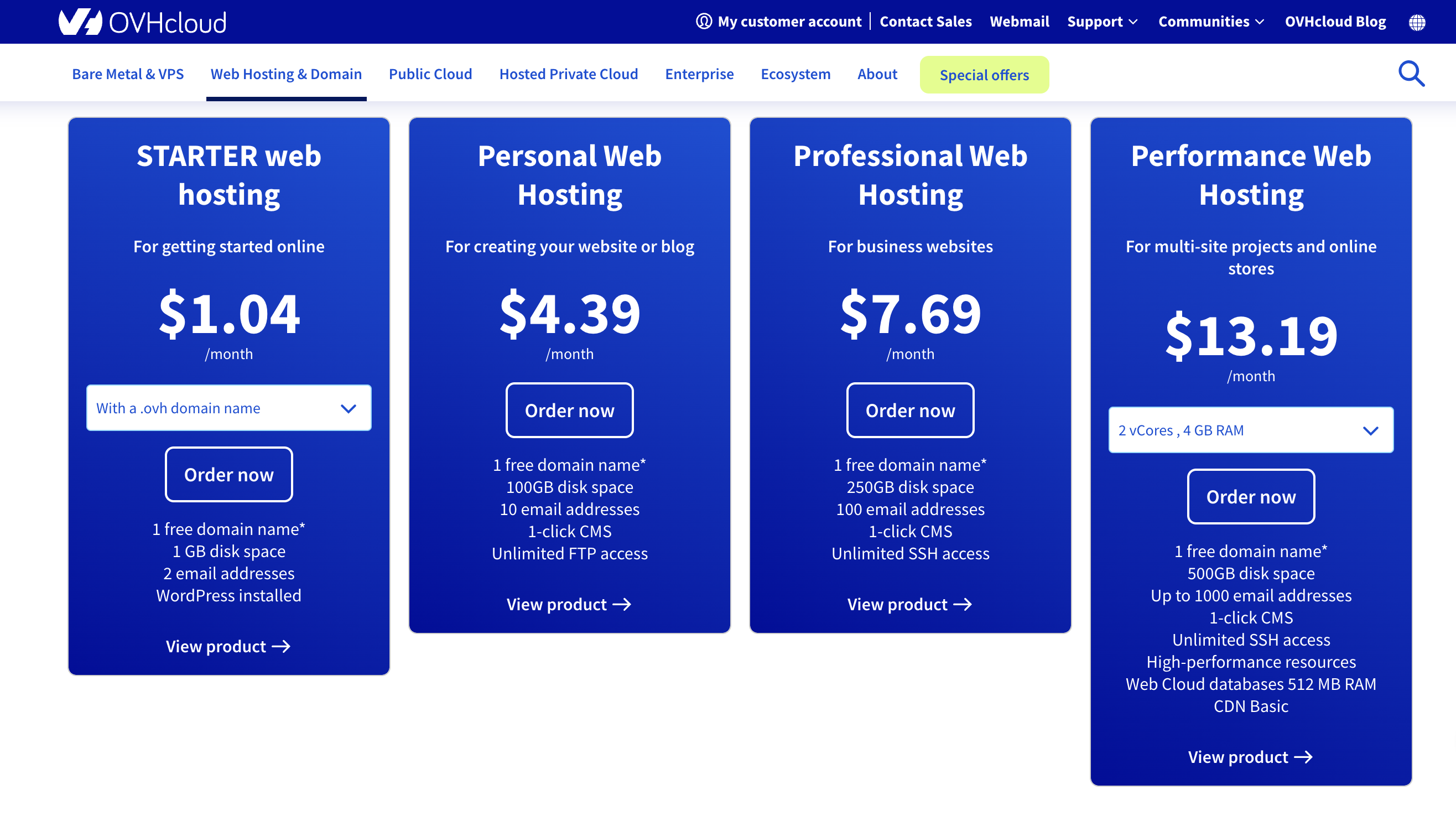
Plans and pricing
OVHcloud’s scope of cloud hosting solutions includes a public cloud, a private cloud, and a bare-metal cloud, under which you’ll find VPS, dedicated servers, managed bare metal hosting, as well as additional storage, backup, network, security, email, and big data solutions, domain name registration, and management services.
The cloud solutions start relatively cheap with the “Personal” coming at $3.99 per month with an annual subscription. This plan can supply you with five websites, a free domain name for the first year, 100GB disk space (SSD), unlimited bandwidth, 10 email accounts (up to 1GB per account), one SQL database (up to 200 MB), support for Python (CGI), MySQL 5.6, PHP (8.0 / 7.4 / 7.3), optimization for WordPress, anti-DDoS protection, and a Let's Encrypt SSL certificate. If you want more features and fewer restrictions on resources, you’ll have to purchase a bigger plan.
Unlike other hosts, OVHcloud doesn’t provide any free trials or money-back guarantees with its services, which means that if you decide to cancel their services, you can say goodbye to any money you’ve invested so far, including additional setup fees.
As for payment methods, with OVHcloud you can pay via credit/debit cards (Visa, MasterCard, and Maestro), PayPal, cheques, postal orders (in value of up to £250), and bank transfers.
Ease of use
OVHcloud’s official site uses a monochrome palette that plays with different shades of blue making itself quite easy on the eyes. It also utilizes a familiar page layout, provides plenty of information and features an up-to-date blog, all of which creates a user-friendly experience. The site is available in French, English, Spanish, Italian, Portuguese, Polish, and Dutch.
Fans of social networking sites can find OVHcloud on Facebook, Twitter, LinkedIn, and YouTube, where all accounts look very much alive.
After selecting a plan you want to use, you’ll be asked to pick out a pre-installed CMS from WordPress, PrestaShop, Drupal, Joomla, or to go without one. As for add-ons, you can include a CDN and extra SSL certificates (Let’s Encrypt SSL comes free of charge). After this, you can choose your domain name, where one is included for free for the first year with all OVHcloud’s plans.
If you have an account with OVHcloud, now is when you need to log in. If not, it’s time to create one, and doing so will need your full name, email address, and password. It’s also advisable to go through the “Terms of Service” before cracking on with any further steps. After this, you’ll have to pass a verification via email and surrender all the additional data (your telephone number, country, city, postcode, and language) to finish creating your account.
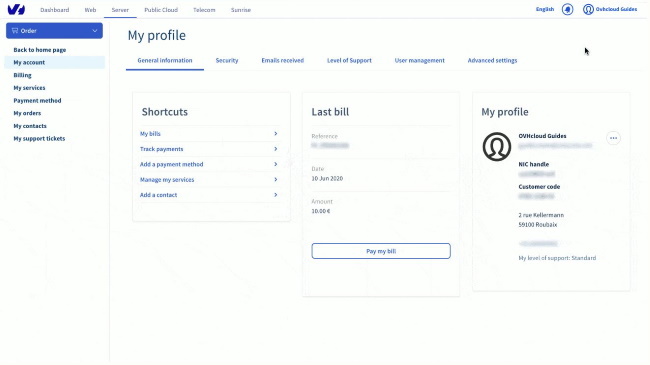
When all of this is done, you’ll gain access to OVHcloud’s dashboard, from which you can complete your purchase if you haven’t done so already. From here, you should be able to monitor and manage all aspects of your account, such as changing passwords, creating/restoring backups, creating/deleting databases, and so forth.
It’s worth noting that we didn’t use the word “should” because of a lack of belief in your abilities but due to the somewhat slow, painfully plain, and not too novice-friendly OVHcloud dashboard.
Unfortunately, even if you are willing to invest some cash into an intuitive industry-standard control panel, you can choose between cPanel, Plesk, DirectAdmin, and ISPconfig3 with only some of the many OVHcloud plans. For instance, industry-leading cPanel is only available with dedicated server hosting plans that start at $56.75 per month, and this isn’t something most users who look for simple solutions will be willing to pay.
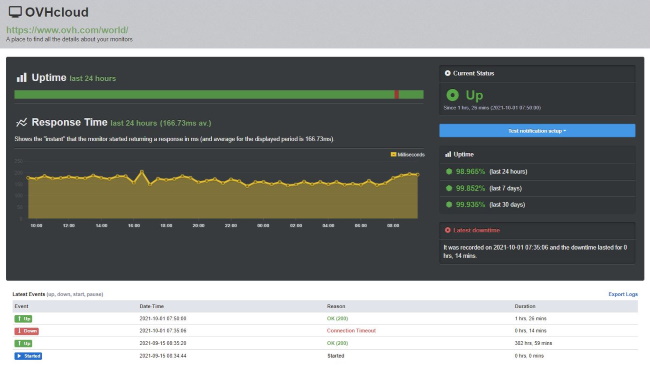
How fast is OVHcloud?
An abundance of data centers scattered across the globe typically predicts lightning-fast speeds, and this is true with OVHcloud. A GTmetrix test performed on OVHcloud’s main site shows that it took 2.9 seconds for it to fully load, whereas the recommended time is less than 3.5 seconds (and the average is 8.1). On top of this, all other web vitals (speed measuring metrics) showed a presentable performance building-up to a near-perfect A (95%) as a final GTmetrix grade.
As for uptime, OVHcloud offers a 99.9% uptime guarantee backed by SLA across most of its VPS ranges. Now, uptime is perhaps the only major area where the service falls slightly short of the competition. Sure, 99.9% backed by SLA is nothing to sniff at, but rivals such as InMotion Hosting offer a 99.999% uptime guarantee, whereas Liquid Web and DreamHost lead the space with a whopping 100% uptime guarantee.
OVHcloud also claims that all of its data centers are designed to Tier 3+ standards, meaning that the maximum amount of downtime a site should suffer throughout a year should be less than 1.6 hours in total (or 99.982% uptime). During a two-week-long uptime test on OVHcloud’s main site (via UptimeRobot), we only recorded a single case of downtime, but that lasted for 15 minutes straight. This amounted to 99.93% of uptime, which is a bit lower than we expected but still in line with the service’s uptime guarantee.
OVHcloud customer support
Although OVHcloud claims to be completely committed to its customers, this doesn’t seem to be the case with its customer support. There are four levels of support: Standard, Premium, Business, and Enterprise support. The lowest level called “Standard Support'' consists of several self-help options including a brief FAQ section, a knowledge base, and a community forum.
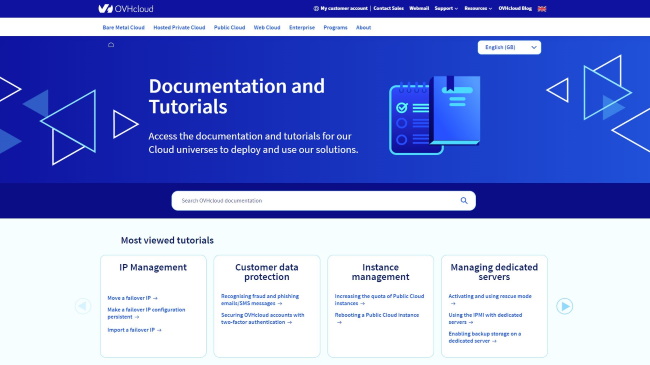
The knowledgebase contains plenty of step-by-step guides (some of which contain videos and others screenshots), which is fortunate since there’s barely anything to help and encourage beginners. On the other hand, the community forum seems quite active—although we did find several months-old questions that are still left unanswered.
It’s worth noting that “Standard Support” is the only level of support that comes with every single hosting solution without any additional charges. “Premium Support” costs $56 per month, “Business Support” starts at $300 per month, and to find what fortune you’ll have to pay to get “Enterprise Support” you’ll have to request a callback from the sales team.
Anyway, you are free to contact OVHcloud’s sales team via telephone (on weekdays from 9 AM to 5 PM) and email/ticket. However, don’t expect to get anything but basic information here. OVHcloud also claims they’re planning to launch live chat support “soon” but they’ve been claiming that forever. The lack of live chat support (even one powered by a chatbot) is disappointing. So, if you have any questions regarding the service and you’d like to reach out to them, you’ll have to send them a message and then wait for a reply.
The competition
All those looking for a cloud-based solution can find an amazing alternative to OVHcloud in a US-based host called DigitalOcean. Both hosts are geared toward developers and tech-savvy users in general, to whom they offer a nice variety of web hosting products, and the similarities stop there. OVHcloud may be much cheaper than its competitor, but with DigitalOcean you’ll get better value for money and a bit better customer support.
Another popular alternative could be Linode, a US-based host with a data center network that parallels the one of OVHcloud. However, while Linode offers a 7-day trial to new users (and a 60-day credit), you won’t get anything similar with OVHcloud.
When it comes to user-friendliness, availability of customer support, and beginner-friendly features (such as free domain registration, industry-standard control panel, and money-back guarantee), HostGator wins the day. That being said, since HostGator has data centers in the USA only, it is less convenient to users elsewhere.
While OVHcloud stays outside the beginner’s comfort zone, Bluehost strives to boost the confidence of less experienced users by offering a full list of beginner-friendly features, round-the-clock support, a one-click installer with lots of apps, a drag-and-drop website builder, and a 30-day money-back guarantee. This means that you’ll have enough time to try everything out for yourself without a need to worry about your budget.
Final verdict
With over two decades of experience, OVHcloud does a commendable job at supplying its customers with a variety of competitively priced cloud-based necessities, including VPS, dedicated servers, bare-metal servers, hosted private cloud, public cloud, as well as hybrid solutions.
On the downside, though, OVHcloud isn’t as geared towards beginners as we would have liked, its customer support needs a serious revamp, and the lack of a refund period means that you can’t try out the service risk-free. If you think this could be a deal killer for you, check out more beginner-friendly hosts such as Hostinger and Bluehost before parting with your money.
- Here's a list of the best web hosting services on the market

Mike is a lead security reviewer at Future, where he stress-tests VPNs, antivirus and more to find out which services are sure to keep you safe, and which are best avoided. Mike began his career as a lead software developer in the engineering world, where his creations were used by big-name companies from Rolls Royce to British Nuclear Fuels and British Aerospace. The early PC viruses caught Mike's attention, and he developed an interest in analyzing malware, and learning the low-level technical details of how Windows and network security work under the hood.
